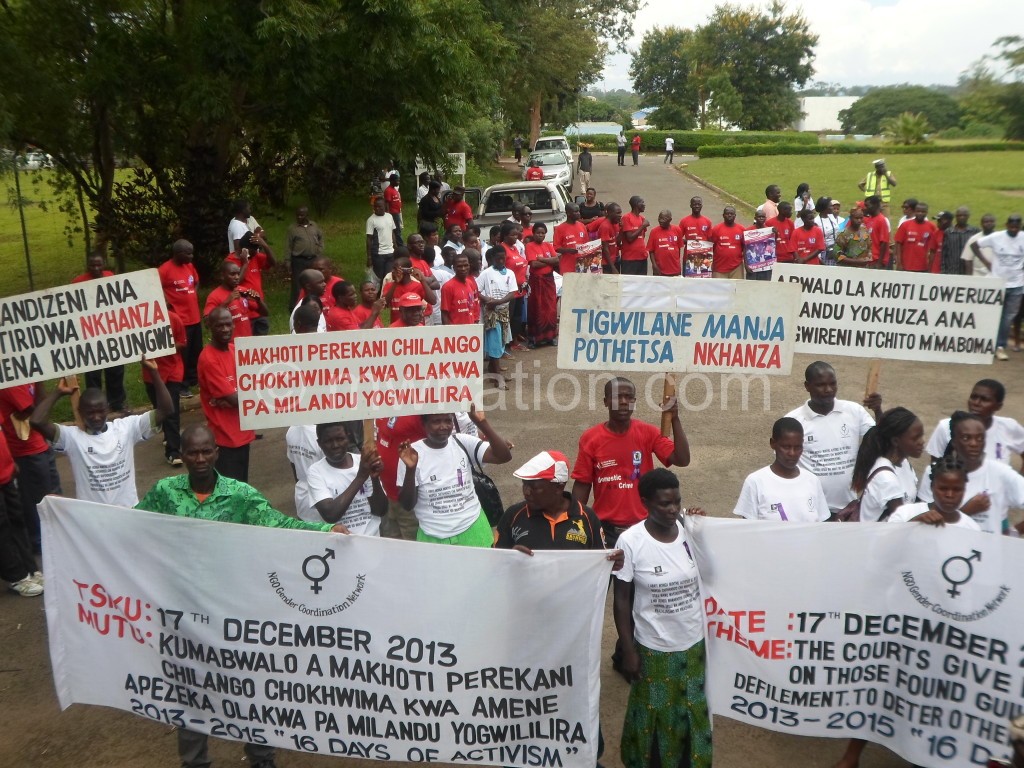Chalera’s road to Damascus
Zero to hero stories did not end the day a notorious Saul became a popular Paul.
In Wavikaza, tongues are wagging about the turnaround of Harry Chalera.

The 40-year-old who used to take pride in beating up his spouse, has become a champion for gender equality and women’s empowerment throughout Nthalire, a rural locality on the eastern part of Chitipa District.
“Beating up my wife was no good, but sleeping around and starving my family made me a laughing stock in my community,” said Chalera.
The repentant man is one of 20 male voices against domestic violence who were trained by Chitipa Women’s Group in partnership with ActionAid.
It appears the change of mindset has not just ended the ill-treatment of his wife. It has also made him a vessel of change to perpetrators of gender-based violence.
“Sometimes it takes a sinner to convert fellow sinners,” he said, likening his turnaround to the conversion of Paul, who stopped persecuting Christians and became a Christian missionary after being struck by a beam of light while on the way to kill believers.
The farmer in Wavikaza talked about not being open on how to spend family income, including after selling tobacco.
“I used to ask her: ‘Is it your money?’ If she didn’t shut up, beatings would follow.”
She reportedly endured “more or less the same treatment” every time he blew her hard-earned money on beer.
But he said the worst happened when she asked for child spacing.
Scars on her cheeks speak volumes of the violence it entailed.
The parents of three have children born with just a year apart.
“After the birth of our first-born in 2003, she wanted to take contraceptives. I said: ‘No, who are you seeing behind my back?’” I didn’t know she meant well until she got pregnant while breastfeeding.”
Not only did the disagreements over birth control fuel suspicion and domestic violence in the family.
It also pushed the man to find more sexual partners, he said.
Fear of reprisals and low male involvement mainly explain low uptake of modern contraceptives in the country.
The 2010 demographic and health figures show only 46 in 100 girls and women use modern methods of birth control.
Besides, the majority of women on contraceptives, about 30 in 100 of them, use injectables. Some women said the tri-monthly method is popular partly because it enables those who take it against the wish of their sexual partners to go undetected.
According to United Nations Family and Population Agency (UNFPA) assistant country director Dorothy Nyasulu, there is need to eliminate cultural practices that require women to seek permission from men to acquire health services, including birth control.
Said Nyasulu: “Women have the right to make decisions about their body and wellbeing without prior consent from anybody.
“Actually, the prevailing restrictions and gender-based violence discourage women from taking long-term family planning methods which are cheaper than injectables as well as those which also protect them from sexually transmitted infections and HIV.”
True to this, Chalera said his second child, born in 2005, would not have stunted had his wife had the liberty to properly space children in the family.
“She looked worried and used to complain about body pains, tiredness and fears of unsafe child delivery, but I didn’t care. The situation worsened with the pregnancy and the breastfeeding baby did not grow well,” he recalled.
Termed kutindibizga, the quick-fire babies marked the beginning of the turning point in the family.
It compelled the Chaleras to embrace child-spacing-for they waited from 2005 to 2012 to have their last born, a daughter.
This has become a key anecdote in his new role as a male champion for gender equality.
Nowadays, he works hand-in-hand with traditional leaders, counsellors and other influential voices to enlighten boys and men in his community to advantages of peace in the home and child-spacing.
Speaking of male champions, Traditional Authority (T/A) Nthalire said: “We are indebted to the likes of Chalera for taking part in ending violence in homes. Creation of a safer world for men and women begins in our homes.”
Towards parity
Gender equality will remain elusive without men’s involvement in confronting domestic violence and other disparities, said Chitipa Women’s Group director Teresa Mkandawire.
“We need to intensify these efforts because most women do not have a voice on marital issues. Men can help bridge the gap,” said Mkandawire.
She rated wife battering and economic deprivation as the most widespread form of domestic violence in Chitipa.
“However, family planning remains a burning issue because some people resort to violent conduct because they have more children than they can afford to raise properly,” she said.
In their line of duty, the male champions are helping couples to know the problem, find lasting solutions and take action.
ActionAid project coordinator Wongani Mugaba salutes the men trained to reach out to fellow men and boys on ills of GBV.
“Some of the champions are reformed abusers. Interestingly, they are influencing positive attitude towards women and girls as equal human beings requiring respect and dignity,” said Mugaba.
ActionAid is also working with Reflection Action Circles to bring together community members to analyse and challenge all forms of gender-based violence against women.
The circles are credited with making survivors aware of the violence and actions to reclaim their rights.
“Some people do not really know they are facing violence, especially where there isn’t physical abuse. The circles have enabled women to report and take action against different forms of violence,” the ActionAid official said.
Brimming with a smile, the female Chalera has experienced both silent and apparent forms of abuse-and doesn’t want to go back to the tearful era.
“My husband made a good choice and I am happy for him. I look younger, don’t I?” she said with a coy smile.





